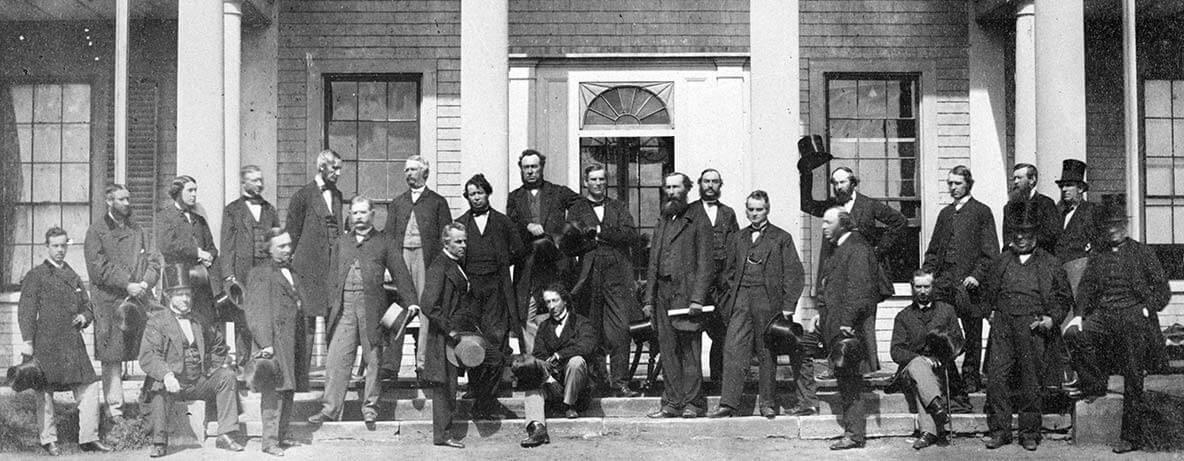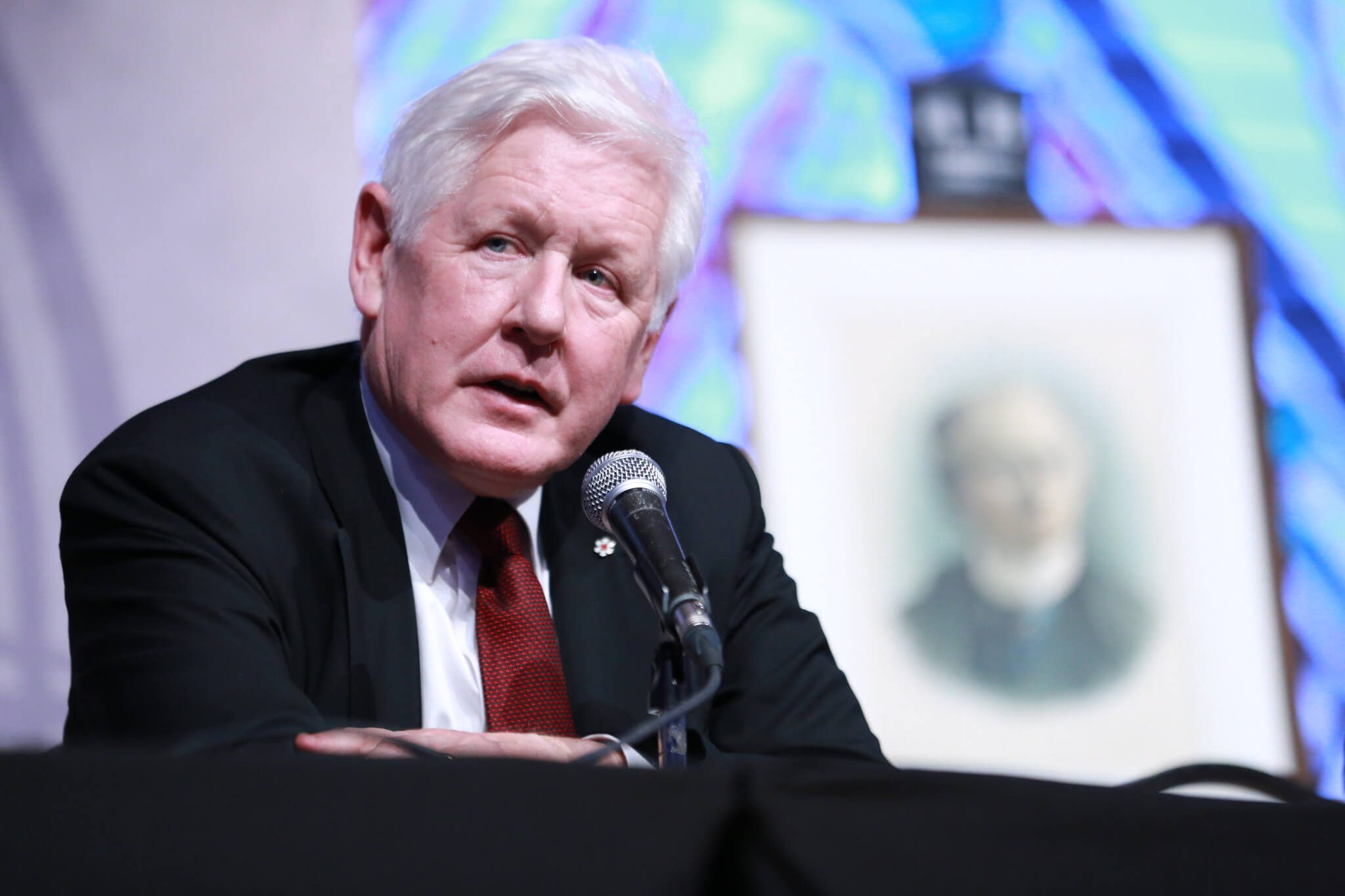![]() Thomas D’Arcy McGee’s speech in the Confederation Debates developed the idea of Canada, and the meaning of Canada’s New Nationality, a phrase he may have himself coined. “What really keeps nations intact and apart?” McGee asked. “A principal. When I can hear our young men say as proudly, ‘our Federation’ or ‘our Country,’ or ‘our Kingdom,’ as the young men of other countries do, speaking of their own, then I shall have less apprehension for the result of whatever trial the future may have in store for us.” McGee argues that Canada has had “three warnings”—from Britain, to prepare for a more self-reliant future, from the United States, gripped by the Civil War and threat to Canada’s frontiers, and finally, a warning from with¬in—Canada itself becoming increasingly ungovernable due to the sectional conflict between Upper and Lower Canada. McGee argues that federalism will unite Canadians, and promote liberty and stability by uniting broader interests within a larger Canada. “There is something in the frequent, fond recurrence of mankind to this principle,” said McGee, “among the freest people, in their best times and worst dangers, which leads me to believe that it has a very deep hold in human nature itself.” McGee’s principle message to Canadians today is the connection of federalism, freedom and the deep reservoirs of moderation inherent in Canadian unity, recalling his famous aphorism, “Unity is to Liberty, as the cistern in the desert is to the seldom-sent shower.”
Thomas D’Arcy McGee’s speech in the Confederation Debates developed the idea of Canada, and the meaning of Canada’s New Nationality, a phrase he may have himself coined. “What really keeps nations intact and apart?” McGee asked. “A principal. When I can hear our young men say as proudly, ‘our Federation’ or ‘our Country,’ or ‘our Kingdom,’ as the young men of other countries do, speaking of their own, then I shall have less apprehension for the result of whatever trial the future may have in store for us.” McGee argues that Canada has had “three warnings”—from Britain, to prepare for a more self-reliant future, from the United States, gripped by the Civil War and threat to Canada’s frontiers, and finally, a warning from with¬in—Canada itself becoming increasingly ungovernable due to the sectional conflict between Upper and Lower Canada. McGee argues that federalism will unite Canadians, and promote liberty and stability by uniting broader interests within a larger Canada. “There is something in the frequent, fond recurrence of mankind to this principle,” said McGee, “among the freest people, in their best times and worst dangers, which leads me to believe that it has a very deep hold in human nature itself.” McGee’s principle message to Canadians today is the connection of federalism, freedom and the deep reservoirs of moderation inherent in Canadian unity, recalling his famous aphorism, “Unity is to Liberty, as the cistern in the desert is to the seldom-sent shower.”
The following is an extract. Thomas D’Arcy McGee’s full Speech in the Confederation Debates can be downloaded here.
The HONORABLE MR. MCGEE said—Mr. SPEAKER, I rise to endeavor to fulfil the promise made in my name last evening by the Lower Canadian leader of this House.
After the four speeches that have already been delivered from this quarter of the House, it may very well be supposed that little of essential importance remains to be said. On Monday the Attorney General West, in exposing the case for the Government, in moving this Address to Her Majesty, went very fully through all the items of the resolutions agreed upon at the Quebec Conference, and gave us a full analysis of the whole project with his own constitutional commentaries upon the proceedings of that body. On the next evening, the Attorney General East gave us his views also, treating chiefly of the difficulties in Lower Canada. The same night, my hon. friend, the Minister of Finance, gave us a financial view of the whole subject; and last evening the Hon. President of the Council gave us another extended financial and political address, with some arguments from “the Upper Canadian point of view,” as the phrase is. It may well therefore seem that after these speeches little of essential importance remains to be stated.
Still this subject is so vast, the project before the House is so vast, and comprehends within it so many objects of interest, the atmosphere that surrounds a subject of this importance is so subtle and fluctuating, that there may be, I am feign to believe, a little joiner-work still left to do—there may be a hiatus here and there to fill up; and although, as far as what is called “the preliminary case” is concerned, the question might perhaps very well have rested with the four speeches already delivered—there may be some slight additional contribution made, and, such as it is, in my own humble way, I propose to make it to-night. (Hear, hear.)
We all remember that in the nursery legend of the Three Kings of Cologne, CASPAR brought myrrh, and MELCHIOR incense, and BALTASSAR gold, but I am afraid my contribution will be less valuable than any of these, yet such as it is I cheerfully bring it, particularly when there are so many in this and the other provinces who would like to know what my own views are in relation to the present crisis. (Hear.)
I propose to consider the question of union mainly from within, and as far as possible to avoid going over the ground.
With your approbation, sir, and the forbearance of the House, I will endeavour to treat this subject in this way:—First, to give some slight sketch of the history of the question; then to examine the existing motives which ought to prompt us to secure a speedy union of these provinces; then to speak of the difficulties which this question has encountered before reaching its present fortunate stage; then to say something of the mutual advantages, in a social rather than political point of view, which these provinces will have in their union, and lastly to add a few words on the Federal principle in general, when I shall have done. In other words, I propose to consider the question of union mainly from within, and as far as possible to avoid going over the ground already so fully and so much better occupied by hon. friends who have already spoken upon the subject.
My hon. friend, the member for Hochelaga, thought he did a very clever thing the other evening when he disentombed an old newspaper article of mine, entitled “A New Nationality,” and endeavored to fix on me the paternity of the phrase—destined to become prophetic—which was employed by a very distinguished personage in the Speech from the Throne at the opening of the session. I do happen to remember the article alluded to as one of my first essays in political writing in Canada; but I am quite sure that the almost forgotten publication in which it appeared was never known, even by name, to the illustrious person who delivered the speech on that occasion. But I will own when I saw my bantling held up to the admiration of the House in the delicate and fostering hands of the hon. member for Hochelaga, I was not ashamed of it; on the contrary, perhaps there was some tingling of parental pride when I saw what ten years ago I pointed out as the true position for these colonies to take, about to be adopted by all the colonies under such favorable circumstances.
Thomas D’Arcy McGee’s full Speech in the Confederation Debates can be downloaded here.



